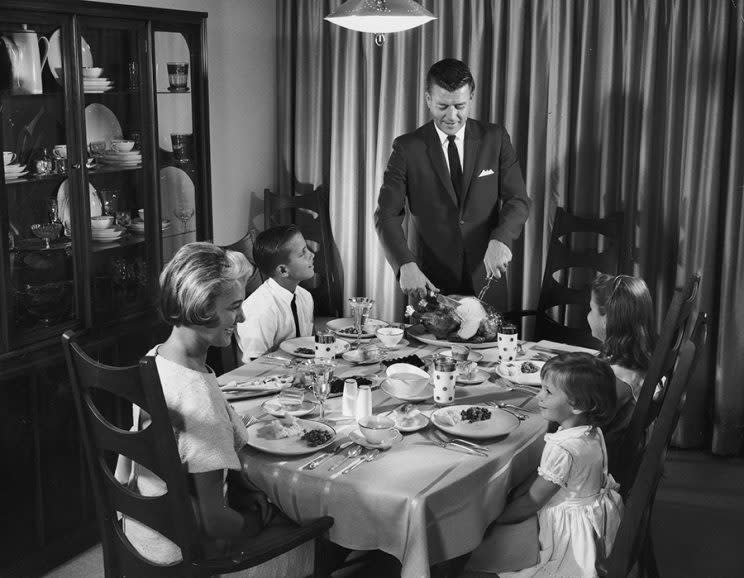How to Handle Talking About Politics When You’re Home for the Holidays

Going home for the holidays is usually a happy time when you’re surrounded by family, good food, and pants with an elastic waistband. But after this unprecedented and brutal election season, all may not be calm and bright when politics inevitably worm their way into the conversation at the family dinner table.
Normally, hot topics like politics, along with religion and money, go against proper etiquette, notes etiquette expert Elaine Swann, but this year seems to be an exception. “Typically, it would be improper to talk about politics at the dinner table, but I look at what’s happening in our world and think it’s healthy to create a space for discussion this holiday,” Swann, author of Let Crazy Be Crazy: Then Politely Get What You Want, Get Your Point Across, and Gently Put Rude People in Their Place, tells Yahoo Beauty. “It’s important to do so because there are so many individuals who are opposites in terms of what they feel [postelection]. It’s important to talk so we can begin to bring our families back together.”
Of course, navigating what is basically a political minefield — unless everyone at your family gathering happens to agree with your beliefs — isn’t easy. But keeping these tips in mind can help you discuss the touchy topic without it ruining your holiday cheer.
Don’t personalize things
It can be hard not to get upset — or even take it personally — when someone is bashing the candidate you’d backed. “It is easy to feel like someone else’s stern words are directed at your character,” Elizabeth Lombardo, PhD, author of Better Than Perfect: 7 Strategies to Crush Your Inner Critic and Create a Life You Love, tells Yahoo Beauty. “But don’t personalize what they are saying as an attack on who you are.”
It may be tempting to bash their candidate right back, but don’t, says Swann. Instead, rather than rattling off facts about why your candidate was the better choice, try sharing the personal reasons you voted for this person or why a particular issue is important to you. “Say, ‘Here’s why I support this particular candidate,’” says Swann. “‘Here’s why I made the decision I made.’ That tends to soften the blow and humanizes the other side.” And then ask them what motivated their decision — and actually listen.
Accept that this is their belief
In an ideal world, you’d explain why your candidate was the right choice and then your Uncle Joe, who voted for the other candidate, would have this amazing aha moment and say, “You’re right! I never thought about it like that.” But in the real world, it’s hard to persuade someone to make such a dramatic flip-flop. The key to a civil political conversation at the dinner table (or anywhere) is to state your case and actively listen to the other person — not try to convince them to change their mind that instant, however much you might want to. “If you’re at polar opposites, don’t try to sway them over to your political ideals,” says Lombardo.
Swann agrees. “There’s a difference between knowing you’re right and having to prove it. Don’t go into the conversation saying, ‘I’m going to convince this person.’ All you can do is share your heart and mind because people are so passionate about what they believe.”
She adds: “People don’t come up with [their political beliefs] on a whim — there might be a lot of thought and history that has led the person to think what they’re thinking. In one setting, we’re not going to shift a person’s thought process. Instead say to yourself, ‘I’m going to leave them some food for thought and let them marinate on this,’ and maybe over time they’ll understand your point.”
But even if you make an utterly convincing argument that any sane, logical person would agree with, your relative or friend may still choose to turn a blind eye and dig in their heels. “In some instances, you have to let crazy be crazy,” says Swann, “and say, ‘I can’t fix crazy.’ The only thing we can do is change the way we respond or react to them. So ask yourself, ‘How am I going to respond?’”
Know when to move on
If the conversation is turning into a shouting match or if a personal attack is made, acknowledge that it’s time to end the discussion and move on. Lombardo suggests saying: “I respect your opinions. Now let’s take a holiday from politics.” And then physically remove yourself from situation. “Go for a quick walk outside, go to the bathroom, move into another room, or go into the kitchen to help out,” says Lombardo. “Sure, dishes may not be your favorite, but they are better than Aunt Betty ranting on.” Or create a distraction to diffuse the situation. “Distraction works with toddlers and may also work with Uncle Alfred,” says Lombardo. “You can say, ‘Hey, Alfred, what did you think about the Cubs finally winning the World Series?’”
If you’re the host and you’d like people to move on to a happier topic, be assertive and say something. “Rather than wish they would stop, politely ask that they refrain from talking about politics,” says Lombardo. Hosts can also have an activity planned to avoid the tough topic of politics if they’d rather keep the peace. “If your family is playing touch football or watching a classic holiday film, they are less likely to get into politics,” notes Lombardo.
And if all else fails, play Adele’s “Hello.”
Let’s keep in touch! Follow Yahoo Beauty on Facebook, Twitter, Instagram, and Pinterest.
